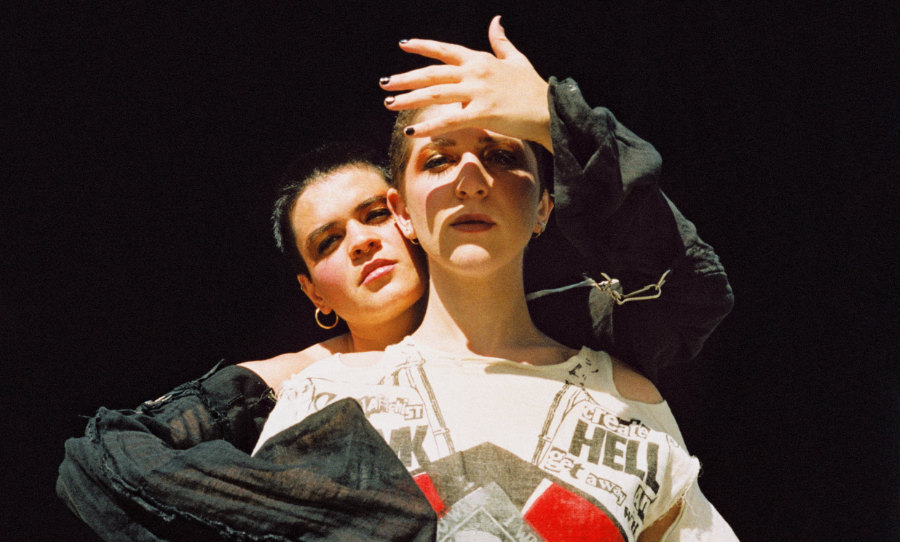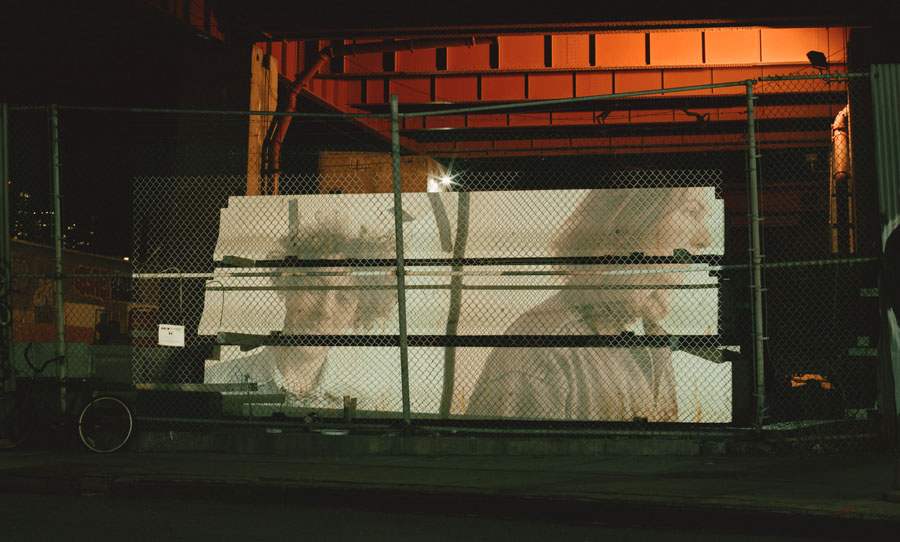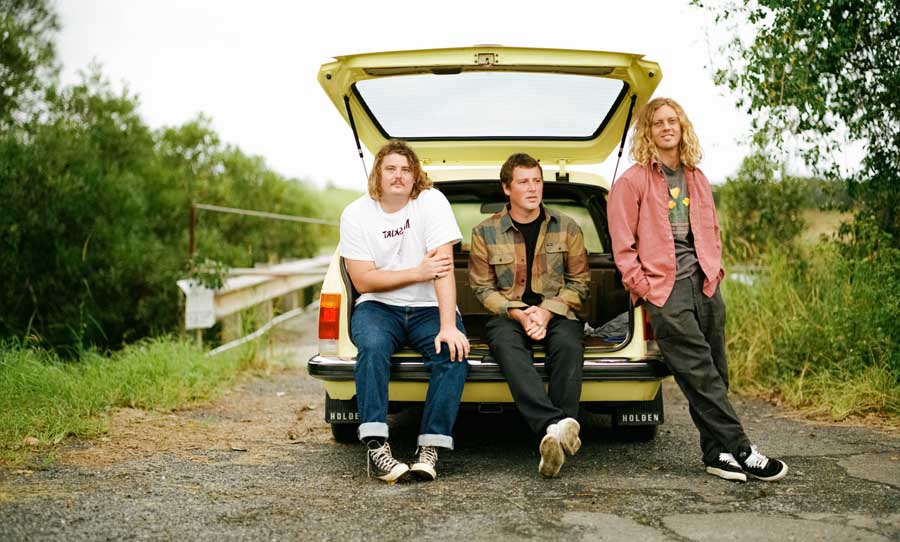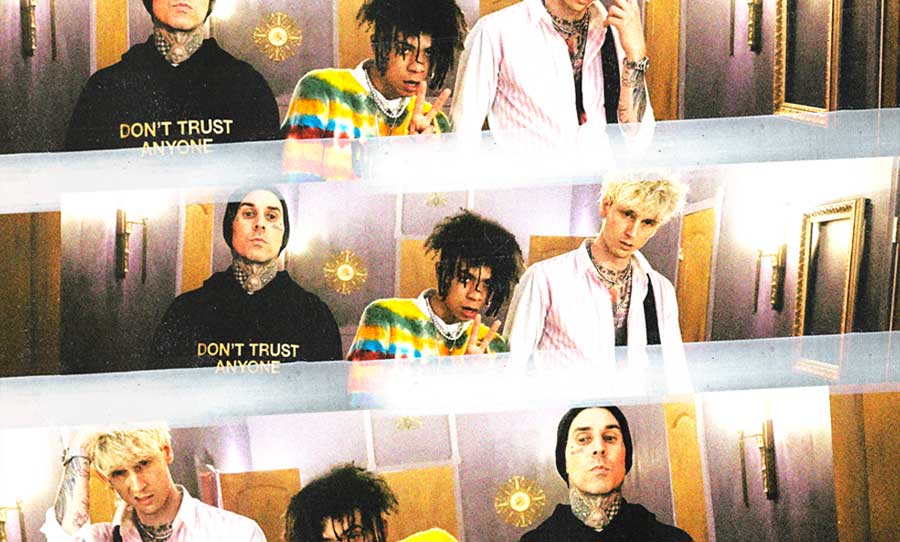The start of 2020 has been a wild ride, to say the least. A nation was on fire, panic is a new norm, denialism has infiltrated the leadership, and artists all around the world are feeling a deep-seated desire for revolution – personal, political, or otherwise.
This is the drive behind Overcoats’ new album The Fight. Though it was written years ago now, the themes it tackles have been extrapolated to an even larger scale since its conception. Hana Elion and JJ Mitchell’s words, it seems, are prophetic.
On the eve of their new album’s rebel yell, we caught up with the pair to chat all about it.
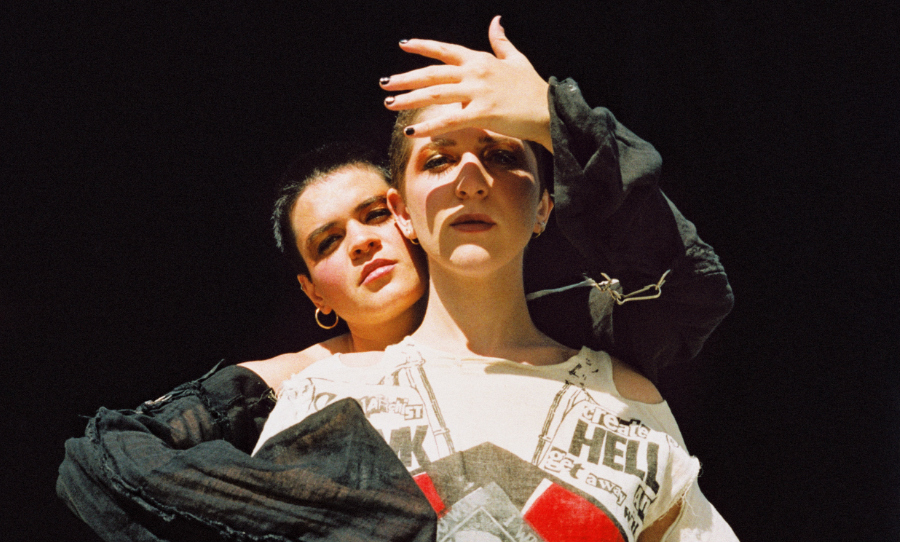
We caught up with Brooklyn-based duo Overcoats to chat about the power of tarot cards, women in music, and angry pottery.
HAPPY: So you started writing this album The Fight as everyone’s favourite leader Donald Trump was coming into the office. Have your feelings towards the social climate in the world at large changed much since then?
JJ: I would say that they’ve only been exacerbated by what’s happened on a more global level since Trump was elected. I think there’s been a general trend towards this kind of isolationist politics. Especially with Brexit, for example, and I think that it’s a more universal plague than we originally thought. And a lot of the themes of the record can be expanded, unfortunately, to other places that are dealing with this political climate.
HAPPY: I definitely agree. Things aren’t exactly too pleasant down in Australia either at the moment. What I wanted to ask though, is when you’re writing something that’s not going to be released for years, is there any consideration that the thoughts and feelings behind those words might become recontextualised by the time people hear them?
HANA: Definitely, I think that happened on certain songs. We’ve kind of noticed little things that are funny. This is not a political example but we wrote a song called New Shoes on our record, that song has a line in it that talks about having long hair. It goes, “What good is this long hair/That flows down my back/If he changes his mind and won’t come?”
And we ended up coming up with this idea to shave our heads for The Fool music video. And then once we did that, we looked at New Shoes and we were like, “Oh my God, this has a line about long hair.” And that was a moment where we kind of recontextualised ourselves. But I think that’s definitely a thing that happens to us all the time. We try to write stories that are vague enough for people to hear their own stories in it. I think Fire And Fury is another song that started off about a personal relationship and we started to realise that it had a lot of poignant messages about climate change.
HAPPY: Is there ever a feeling that you wish you could have changed something in that situation? I hear stories now with releases that are very streaming-based where artists literally change things the week that they’re going to be released. I know that’s impossible in a lot of cases, but is there ever a temptation?
HANA: Not yet for us. I haven’t wished thus far that anything could be changed or different. And I think that’s something nice about an album or a body of work, it kind of is a reflection on a certain time. It describes the experiences at that moment and it’s nice to look back on them – even if they feel like they’re in the distant past – and appreciate them for what they are. Some of the songs we wrote almost two and a half years ago and so I think you’re right that it feels like things might have changed since then. But I think it’s always nice when an album captures a certain moment.
HAPPY: On shaving your head – to me it’s sort of like wearing war paint. Did that affect the way that you performed or found yourself presenting to the world?
JJ: Yeah, it’s a very powerful thing to do, especially in a city as busy as New York because you’re constantly surrounded by people. You definitely notice that people interact with you a bit differently when you’re a woman with a shaved head. It was very powerful as we were making our album and dealing with people that were turning on our music for the first time, advocating for ourselves because it definitely bothers you in a way that you just don’t look like everybody else. That can actually be a very empowering thing, we found. In terms of performing it’s very freeing because there’s nothing to shake around.
HAPPY: Was there any historical or personal significance there?
JJ: Absolutely, we were definitely inspired by women in history who have shaved their head and cut off all their hair as a political and social statement. That definitely played into both feeling confident enough to do something like this and also in the way in which it’s powerful to alter your appearance and to mess with gender norms. I think that some of those women, including Sinead O’Connor and Grace Jones, were specifically talking about the music industry and the problems with the way that they were at being asked to present. I think that we wanted to shake that idea as well and kind of redefine our image in the way that we wanted to. So there was definitely some historical influence and also it fit with this idea of wanting to be warriors and binding ourselves together with some kind of act.
HAPPY: Now you built a tarot deck for the album’s vinyl package. Is there a relationship between tarot cards and the album? Or is it just a personal interest?
HANA: When we were writing this album we went to LA with a suitcase each, we were sent there to just go make it for six weeks. So we would pull a tarot card for ourselves every day before we’d go to the studio. The cool thing about tarot is there’s a lot of misconceptions about it being like, predictive or mystical. But in a lot of ways… At least the way we do tarot is the cards are supposed to reveal a truth that’s already inside you. So it’s not like they’re telling the future but they’re giving you guidance on something you may already know inside you but haven’t connected to, so we use them in that way to give us confidence and guidance about what kind of song we wanted to work on that day or whatever. And The Fool, which is a tarot card, inspired the song of the same name. We were really into the idea of bringing these cards onto the album, and so that’s why we made a deck.
HAPPY: So there’s one for every song?
HANA: There is.
HAPPY: Are you going to integrate those into your life afterwards or stick with the old deck?
HANA: I think we’ll integrate them.
HAPPY: What is the deck that you took with you to LA? Do you have the full 70-card card deck or do you go with the Major Aracana deck?
JJ: We have a few different decks that we like to draw from. I think the one that we had with us in LA while making the record was 70 cards and it’s called Motherpeace. All the cards and their respective meanings and stories are all about women, and so that was a very fun deck to have with us while we were making this very feminist and unapologetic album.
HAPPY: Fantastic. Do any of you practice any kind of art outside of your music?
JJ: Both of us are visual arts as well.
HANA: We do! I really like painting, weaving, drawing, and pottery.
JJ: Yeah, we both have this unending flow of creativity and we’ve got to put it somewhere.
HAPPY: Do those other practices scratch the same itch? Like, I find it hard to imagine a kind of angry pottery.
JJ: (Laughs) Oh you’d be surprised.
HANA: Yeah, you should see me at the wheel.
JJ: I think that I often use the other forms of art to express things that aren’t necessarily getting expressed in the musical side of my life. So I think it often doesn’t feel super related and the visual art that I’m doing lets me exercise the other side of my brain in a way. I don’t know if it’s the same for Hana.
HAPPY: I think a trap a lot of people fall into with this ‘world on fire’ mentality is that there’s nothing that we can do to change it. Do believe that? And is there something you’d like your fans to take from this album that swims against that feeling?
HANA: I think you can change it. Whether or not that’s true I think it’s necessary, because if we don’t try then what’s the point? And I think that this album is very much about that, you just have to fight for what you think is right and what you want to see in the world because there’s no other alternative when things are bad.
HAPPY: So starting with a personal change that informs a wider one.
JJ: Absolutely, I think that when we made this record and sort of as we were starting to write the song we felt like we had a responsibility as musicians to spread some hope. A lot of the songs are very realistic in what they’re talking about and the hopelessness that we’re faced with the war on women’s bodies that’s occurring definitely in the United States, but perhaps more globally. Also the fight with one’s own demons which is ongoing. We talked together about how we need to instil some hope in our music so we tried to do that on this record. Hopefully, people can take what they need in order to fight for the things that they want.
The Fight is out now via Loma Vista Recordings / Caroline Australia.
